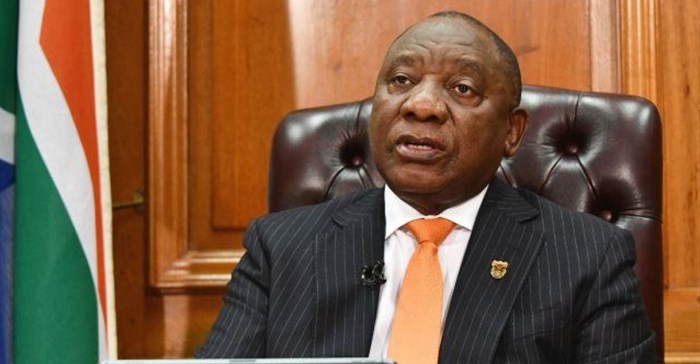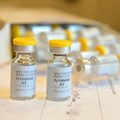President announces Covid-19 resurgence plan, eases alcohol, travel restrictions

He said that although infections have stabilised, many people are still contracting the virus daily and remain vulnerable. “We are seeing how quickly and how dramatically infections can rise in a number of countries. We are also seeing how health systems can become overwhelmed in the face of rising infections.”
Globally, the highest number of weekly new cases since the start of the pandemic and the highest number of weekly deaths was recorded. Over 51-million people have been infected globally, while 1.2-million patients succumbed to the deadly virus.
“Many countries are in the midst of the second wave of infections, which has often been more severe than the first. What we are seeing brings home a difficult truth that Covid-19 is far from over,”Ramaphosa said.
The latest figures reveal that South Africa’s coronavirus death toll had reached 20,011, while the confirmed cases are now sitting at 742,394.
President Ramaphosa said government has identified areas of attention to prevent a resurgence of infections in the country,
Eastern Cape
On top of the agenda is the situation in the Eastern Cape, which is showing signs of resurgence after recording 50% more cases than the previous week.
Meanwhile, the total number of new cases in the last 14 days peaked by 145% than the previous 14 days.
According to the president, massive spikes have been reported in the Nelson Mandela Metro and the Sarah Baartman District in particular, while the province has noted an upward increase in hospital admissions.
The spates of Covid-19 outbreaks are sparked in universities, schools and people attending large gatherings. This is coupled with poor adherence to social distancing, mask-wearing and other poor hygiene measures. “With many people moving between the Eastern Cape and other provinces – particularly the Western Cape – it is a matter of time before this surge spreads to other parts of the country.”
He has urged the public to adopt measures to contain the rise in infections. “To ensure that we can keep all the necessary prevention measures in place, we are, as required by the Disaster Management Act, extending the National State of Disaster by another month to 15 December 2020,” he said.
Resurgence plan
The government plans to implement the resurgence plan soon that has been developed together with the World Health Organisation’s surge team deployed to South Africa. Interventions include intensifying contact tracing, daily community mobilisation, ensuring the readiness of health facilities, and dealing with cluster outbreaks.
“We will be working closely with the provincial government, municipalities and other institutions in the Eastern Cape in the coming days and weeks to ensure that this surge is contained and managed.”
He believes that the Eastern Cape should be a wake-up call to all and that citizens cannot relax and be complacent. “We are therefore also closely monitoring developments in areas that are experiencing higher than average rates of new infections.”
Also, the areas where there are higher than average rates of new infections include Lejweleputswa and Mangaung in the Free State, Frances Baard and Pixley ka Seme in the Northern Cape, and the Garden Route and Cape Town metro in the Western Cape.
Festive season
Ramaphosa said there should be no need to return to a higher alert level for as long as people observe all the necessary health protocols and remaining restrictions – as individuals, businesses and institutions. “From the progress, we have made, from the lessons we have learnt, we now know that under the current alert level 1, we have all the tools we need to prevent a resurgence.”
Another concern is the upcoming festive season that will see many people travel to other parts of the country and host social gatherings. “These activities, if not undertaken responsibly, pose the greatest immediate threat to our management of the pandemic,” he said.
However, to avoid a second wave, everyone should play his or her part. He has urged everyone to wear a mask. “Wearing a mask every time we leave home is far, far better than a second wave. It is also far better than a return to lockdown and better than having to shut down the economy.”
Vaccine
Ramaphosa welcomed the news that pharmaceutical company Pfizer has seen success in the development of a coronavirus vaccine, and the announcement that local pharmaceutical company Aspen has entered an agreement with Johnson & Johnson for the development of a vaccine in the country.
“In recognition of our country’s manufacturing capability one of the leading pharmaceutical companies in the world, Johnson & Johnson, has entered into an agreement with a local company, Aspen Pharmacare, to manufacture and package its candidate vaccine," he said.
Easing restrictions
Despite these concerns, Ramaphosa said that government will ease some restrictions, including the hours when alcohol can be sold by liquor stores.
Even as restrictions on the sale of alcohol are lifted further, we are mindful that excessive alcohol consumption is a hinderance in our fight against the coronavirus. It is vital that South Africans act responsibly to ensure we do not see a spike in alcohol-related incidents. pic.twitter.com/vhm76igRFb
— Presidency | South Africa ���� (@PresidencyZA) November 11, 2020
In addition, the president said that the country will reopen international travel to all countries subject to health and safety regulations, and a clearance certificate.
As restrictions on international travel are lifted, it is more important than ever for travellers to follow all safety protocols to protect their health and minimise the risk of acquiring Covid-19. pic.twitter.com/mv3M9L7uQb
— Presidency | South Africa ���� (@PresidencyZA) November 11, 2020



























